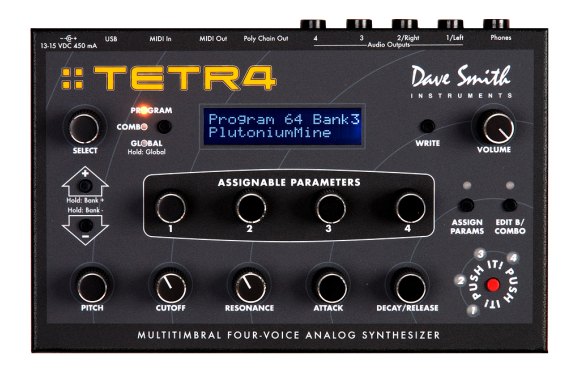Quadruple quadruple your refreshment, quadruple quadruple your enjoyment… sorry, I started quoting old Doublemint Gum jingles. As expected, Dave Smith has released his Tetra (“Tetr4” in the l33t speak on the case). The name says it all: the Tetra takes the popular Mopho synth and packs four of them into a single, compact case. The Mopho was featured in the CDM Winter Guide and was one of the favorite reader products of 2008. Its strength is that it’s a great-sounding synth in a small box with all the basic analog goodness. The Tetra simply takes that design and squeezes four of them into a box. That’s four voices, each with two oscillators (which in turn come with sub-octave generators), one Curtis low-pass filter, and feedback loop per voice. You also get the step sequencer and arpeggiator features.
 The Tetra also shares a name with the badass pirate version of the Princess Zelda from recent Nintendo games.
The Tetra also shares a name with the badass pirate version of the Princess Zelda from recent Nintendo games.
Now, the Tetra, like the Mopho, still remains a terrific choice for people wanting some simple analog goodness. But as noted in the Winter Guide, Dave Smith still has some tough competition …from Dave Smith. The Evolver’s digital oscillators may not appeal to analog purists, but they allow Frequency Modulation and Ring Modulation effects. And the Evolver has a digital highpass filter. Of course, the Evolver now has to stand up to the Tetra’s additional voices, which enable routings that weren’t possible before. But I’m hoping increased Mopho and Tetra demand may lead to some cheap used Evolvers on the market; I badly want one. Even from Dave Smith direct, at US$599 on sale I think the Evolver is still worth a look, even if it loses on voice count and doesn’t have those cool, accessible front-panel controls.
The Tetra is priced at US$799 direct from Dave Smith, or at your local reseller. And Evolver comments aside, it’ll clearly be the synth to beat – it’s a pretty amazing investment in an analog synth for $800, and it’s small enough to toss in a backpack – no flight case needed. You can route audio input into it with feedback. And the design eschews the psychedelic looks of the Mopho for a more grown-up, handsome look. Correction: The Tetra seems to lose the audio in present on the Mopho – one reason the Evolver and Mopho are still strong alternatives. You do keep the feedback routing, but there’s no audio in. (Thanks, mcpepe in comments – so it’s not quite like having four Mopho’s in one case; they had to cut something!)
I think Dave Smith’s work has a reputation for being favored by analog snobs – you know who you are. But it’s clear that these make nice hardware synths for computer fans, too, especially thanks to its compact size. If you pick one up, readers, let us know how it goes and how you use it.
…and the oldie but goodie: Dave Smith Evolver (now, could we have a Quadvolver, perhaps?)
